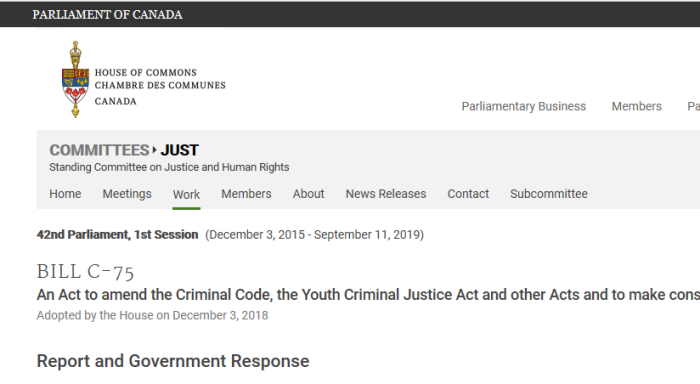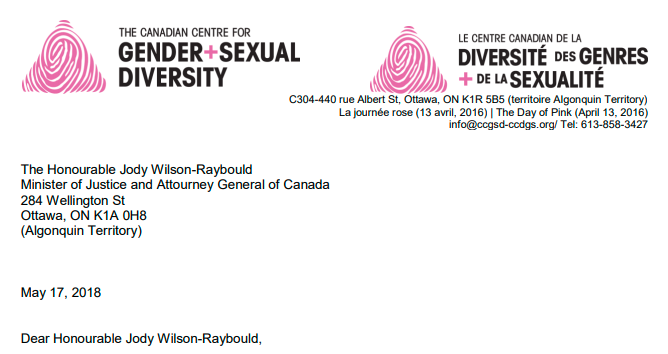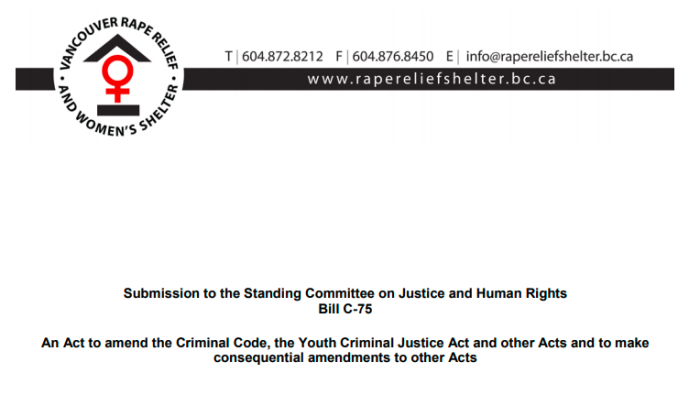
Bill C-75 was an omnibus piece of legislation. Given its size, it was impossible to properly debate back in 2017/2018. But it’s worth reviewing, even after the fact. It watered down penalties for terrorism offences, and once for reducing penalties for crimes against children. This piece looks more at some of the groups trying to influence the legislation.
1. EGALE Canada Human Rights Trust
From around 16:23 in this September 25, 2018 transcript from the Parliamentary Hearings on law and justice. A few points worth noting.
First: while this is cloaked as a social justice issue, there seems to be no concern for the consequences of the changes sought here. Second: what is wrong with the parents of young children wanting their (intersex) children from having normal lives as a recognized gender? Third: there is the claim that gays are discriminated against because the age of consent is higher than with straight couples. Strange how they always want it lowered, and never propose RAISING it overall.
2. Centre For Gender And Sexual Diversity

Following the introduction of C-39, An Act to amend the Criminal Code (unconstitutional provisions) and to make consequential amendments to other Acts, the CCGSD was excited that the government was looking serious at equalizing age of consent legislation. We applaud the government on including this as is critical step forward. The CCGSD has been asking for this critical change since 2008. This is critical to the LGBTQI2+ communities as the criminalization of consensual sexual acts between Canadians should be seen as equal under the law regardless of your sexual orientation or gender identity
What they refer to as “equalizing the age” of consent was the provision to reduce the age of consent for anal sex from 18 to 16. Normal sex has a minimum age of consent of 16, years old, and even that was only recent. It used to be 14. The Centre for Gender and Sexual Diversity has deemed it a “priority” to lower the age of consent — since 2008 — instead of asking for a higher universal standard.
They talk about equality for consensual acts between Canadians, but they don’t mentions consensual acts between ADULT Canadians. That detail seems left out.
1-Bill C-75 fails to address sex work criminalization
The criminalization of sex work has been ruled unconstitutional by the Supreme court and continues to put Canadian sex workers in danger. Local, provincial and federal police services continue to use existing legislation to harass and criminalize folks who should be allowed to do their job with the support and protection of the state.
We strongly recommend that a clear decriminalization of sex work be included in C-75.
There doesn’t seem to be any moral issues with sex work itself, or the dangers or moral issues it causes. Instead, CCGSD takes issue with there being laws against it.
2-Bill C-75 fails to protect intersex children from non-consensual surgery
In June 2017, the CCGSD came out with our Pink Agenda making it clear that we stand in solidarity with Intersex communities and their right to decide what is best for their bodies, and yet today Section 268(3) of the Criminal Code of Canada allows non-consensual surgery by medical practitioners to alter the bodies of infants and children whom they perceive to be ambiguous (i.e. intersex).
We strongly recommend that the repeal of Section 268(3) be included in C-75.
We can’t have parents attempting to correct birth defects the best way they know how, in order to help their children go about their lives. What is wrong with them simply being normal boys or girls?
3-Bill C-75 fails to repeal the ‘bawdy house’ laws or obscenity laws that disproportionately affect queer and trans people
The ‘bawdy house’ laws have continue to criticized by many LGBTQI2+ organizations, including most recently the coalition of LGBTQ2I+ and allied organizations during the debate on C-66, An Act to establish a procedure for expunging certain historically unjust convictions and to make related amendments to other Acts (http://ccgsd-ccdgs.org/c66). These laws continue to be used to criminalize consensual LGBTQI2+ behaviours, and need to be full repealed.
We strongly recommend that the repeal of the ‘bawdy house’ laws be included in C-75
An bizarre argument. While claiming that gays aren’t perverts, the CCGSD also claims that laws against degeneracy disproportionately impact them. Doesn’t that undermine the original assertion?
3. Vancouver Rape Relief — Domestic Violence

The change to reverse onus bail in cases of male violence against women is an encouraging step to help reduce the number of men who immediately re-offend and attack their female intimate partners. It is a positive step because the onus is on the offender to prove why they should be let out on bail if they have a history of domestic violence. This sends a message that violence against women is a serious crime. It is, however, unfortunate that this reverse onus will not apply to those men without a criminal record for domestic violence, which will include convicted persons who received an absolute or a conditional discharge. What we see from our work is getting a conviction is rare; when it does happen often its a man of colour. As a result, we can see the possibility that something like this will disproportionately affect racialized men, while the majority of men who go without being charged and convicted remain unaccountable and undeterred.
Eliminating the mandatory use of preliminary inquiries as it relates to women who have been sexually assaulted is a positive step. We know from our experience accompanying women to court that preliminary inquiries are used by the defence as an attempt to discredit their testimony by pointing out minute discrepancies from their police statements, their preliminary inquiry evidence and their trial testimonies.
Vancouver Rape Relief brings a few interesting arguments into the discussion. First, they are upset that the “reverse onus” provisions of bail won’t apply to men without past convictions for domestic violence. Second, they support eliminating mandatory use of preliminary inquiries, which are an important step of discovery prior to trial. It doesn’t appear that they actually support the idea of due process.
4. Individuals Opposing Degeneracy Laws
Regarding the last video, the crime itself is failing to disclose HIV status with sexual partners. However, it’s frequently misnamed as “criminalizing people with HIV”. Knowing that the other person has this disease is pretty important, regardless of how deadly it might be.
It’s worth pondering: how many of those people who are okay with not disclosing HIV status to sexual partners would be okay with forcing masks and vaccines on people?
5. Does Anyone Care About These Reductions?
- Section 58: Fraudulent use of citizenship
- Section 159: Age of consent for anal sex
- Section 172(1): Corrupting children
- Section 173(1): Indecent acts
- Section 180(1): Common nuisance
- Section 182: Indecent interference or indignity to body
- Section 210: Keeping common bawdy house
- Section 211: Transporting to bawdy house
- Section 242: Not getting help for childbirth
- Section 243: Concealing the death of a child
- Section 279.02(1): Material benefit – trafficking
- Section 279.03(1): Withholding/destroying docs — trafficking
- Section 279(2): Forcible confinement
- Section 280(1): Abduction of child under age 16
- Section 281: Abduction of child under age 14
- Section 291(1): Bigamy
- Section 293: Polygamy
- Section 293.1: Forced marriage
- Section 293.2: Child marriage
- Section 295: Solemnizing marriage contrary to law
- Section 435: Arson, for fraudulent purposes
- Section 467.11(1): Participating in organized crime
These are not minor or unimportant crimes. In fairness, there are a few submissions that speak out about the hybridization of these offences (making them eligible to be tried summarily). Who came up with these though? Why are such crimes being shrugged off. Sure, the terrorism offence penalties caused backlash, but not these. It’s almost as if they wanted to divert attention.
As for watering down terrorism offences, where did that idea come from? CIJA, the Centre for Israel and Jewish Affairs spoke against some of these provisions. But it’s unclear who was the brains behind the proposal
Now, it should be noted that changes to the MAXIMUM sentence of certain crimes would make law students and paralegals ineligible to work on such cases. While not a defense of criminals, everyone should have access to some representation.
Who was Bill C-75 really designed for? It comes across as if a group wanted to destabilize society, and wrote collaboratively on it.
(1) Parliamentary Study On Bill C-75 (Fall 2018)
(2) Bill C-75 Canadian Centre For Gender Sexual Diversity
(3) Bill C-75 Canadian Civil Liberties Association
(4) Bill C-75 EGALE Canada Human Rights Trust
(5) Bill C-75 Vancouver Rape Relief
(6) Bill C-75 Law Society Of Ontario
(7) Bill C-75 Tom Hooper Et AlBill C-75 UNICEF Canada
(8) Bill C-75 Families For Justice Alberta
